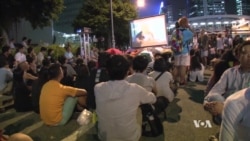After more than three weeks of protests, an uneasy calm settled over Hong Kong as the public began to digest the implications of a first round of talks between the government and the Umbrella Movement protest leaders.
In talks that were broadcast live, the activists pursued their demand for the public to freely choose candidates for the 2017 leadership elections. However, the government made few concessions and uncertainty persists about what comes next.
Five members of the Hong Kong Federation of Students faced five members of the Hong Kong government over a conference table Tuesday evening.
In a two-hour dialogue dense with legal arguments, the delegates, led by Alex Chow for the Hong Kong Federation of Students and Carrie Lam, chief secretary for administration, remained civil throughout.
No movement
In the opening exchanges, Lam ceded no ground. She clarified her position to reporters after the talks.
“As far as their position is concerned, I am afraid we can only agree to disagree," Lam said. "Our firm position is that the selection of a chief executive by universal suffrage in 2017 has to be done in accordance with the legal framework laid down by the National People’s Congress [on] August 31."
The talks, which took place at the Hong Kong Institute of Medicine, far from the occupied zones of the Mongkok neighborhood and the Central business district, provided few concrete concessions and even less sense of what comes next. Lam did, however, propose gathering cross-community views on further constitutional reform for elections after 2020.
“We have made a plea that we should not just look at the election in 2017," she said. "And that is why I have suggested that we will consider together with various stakeholders the idea of a platform to consider the long-term constitutional development of Hong Kong.”
Constitutional reform
The government also raised the possibility of filing a new report to the central authorities on public views regarding constitutional reform. This suggestion comes after a previous submission, believed to be the basis for Beijing’s August decision, was widely condemned for lacking objectivity.
Chow, a 24-year-old literature student, expressed skepticism about both proposals. He hinted that protesters will remain on the streets.
“Whether they have a concrete impact is still a question," he said. "The government needs to further explain things to the public. Whether this solution could settle the current constitutional problem, well, it needs further observation. It is vague.”
After the talks Chow said he was returning to the occupied districts to discuss the meeting with activists, before he would signal the protest movement’s next steps.
Hong Kong leader Leung Chun-ying gave no immediate comment on the negotiations.
Wide gulf
Leung caused outrage on Monday when a New York Times interview quoted him saying electoral reform would give too much influence to the Hong Kong working class.
Speaking at an earlier news conference, through an interpretor, he also addressed public skepticism about his claim that foreign interests are involved in the Umbrella Movement, saying he would reveal details when he was ready.
“This claim is not based on a guess," said Leung. "I have the responsibility to know these things. I believe any government in the same situation will come out and face the fact. On how it will be disclosed, I will at a suitable time make suitable considerations.”
Out on the streets, there is a sense that instead of bringing the parties together, the first round of talks has highlighted the gulf between the government and pro-democracy activists.
However, neither side precluded further talks following this initial dialogue.








